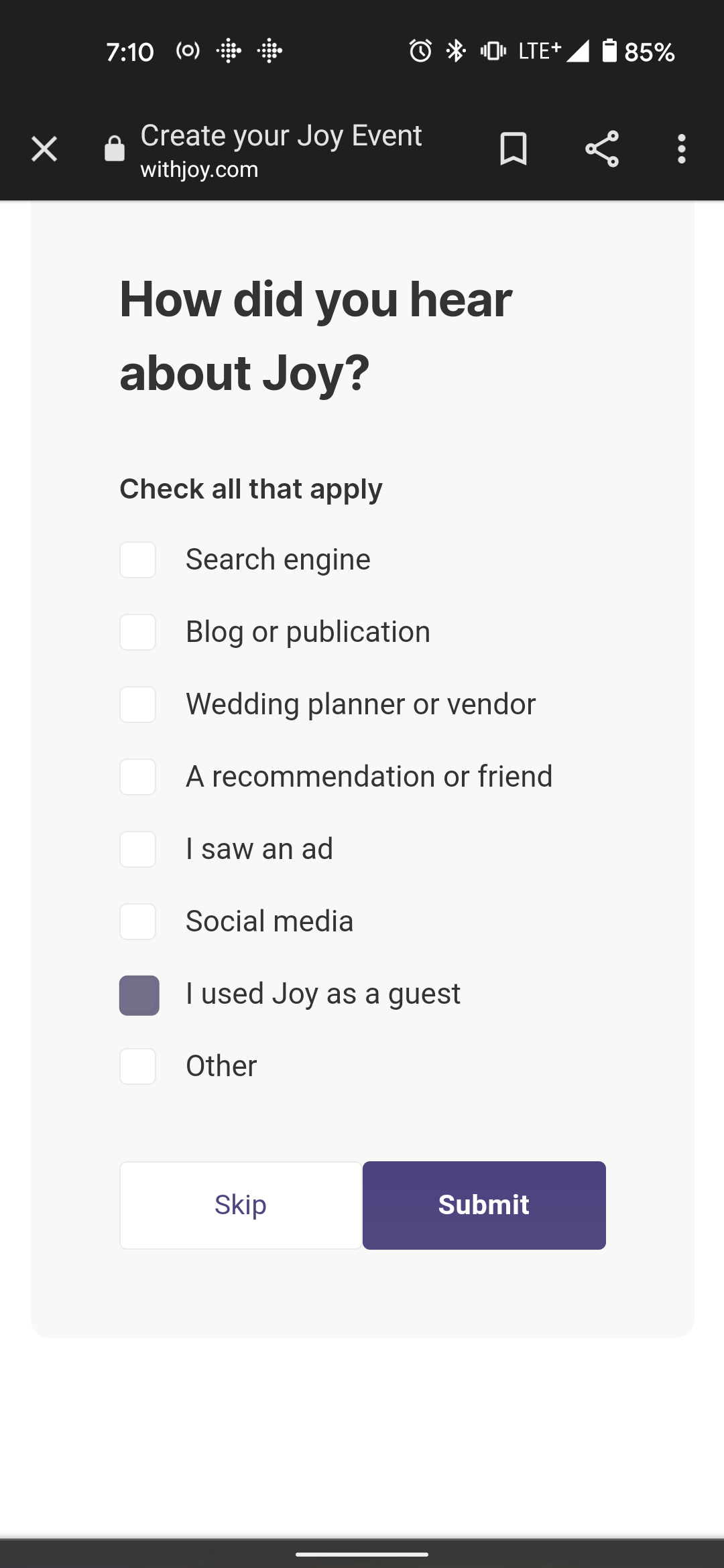My girlfriend and I got engaged last month!
We decided to keep our engagement short. Our wedding is set for about month from when I popped the question—this weekend, in fact!
Planning a wedding in such a short time has been a bit stressful, but we’re on track. One company that helped save us a lot of headache was Joy. They build software for wedding planning—managing guests lists, invites, registries, etc..
It’s a pretty good product and I would recommend it. But the only reason we knew about it was that some friends of ours had used it for their wedding. I’m guessing this is a big growth channel for Joy. “I used Joy as a guest”, was one of the options in their on-boarding questionnaire.
This is a great example of “demand driving supply”, an interesting growth loop for marketplace companies. Joy doesn’t fit the marketplace mold perfectly, but you can think of them as a platform that connects couples getting married (supply) with wedding guests (demand).
For every wedding that is planned with Joy, Joy gets free advertising to all the wedding guests. Some of those wedding guests might want to get married in the near future. And when it’s time to send the invites they’ll recall that Russell and Evan used this website called Joy for theirs and it seemed like it worked for well.
Some of the demand (wedding guests) will eventually convert to supply (couples getting married and using Joy). This is demand driving supply.
This is great for Joy. Unlike other marketplaces, they don’t have to worry much about demand acquisition—couples will bring their own guests. But they do want to increase supply—the number of couples using Joy to plan their wedding. And this particular growth loop of converting previous guests into customers is probably an important one for them.
This is a common growth loop for marketplace companies. Brian Rothenberg has a good post about it in Lenny’s newsletter. He uses Eventbrite as an example of the loop:
Eventbrite recruits an event creator
An attendee buys ticket(s) to the event through Eventbrite and gets excited about organizing their own event
The attendee becomes a creator
But the same loop is present in many major marketplaces companies, Airbnb, Lyft, Square. Folks experience the product on the demand side, as a guest, rider, or customer. Later on, they use the product from the supply side, as a host, driver, or merchant.
The reason I ‘m interested in this growth loop is because it’s happening more and more at SharpestMinds. It wasn’t until reading Brian’s post that I was able to frame it in the proper marketplace jargon.
SharpestMinds is a marketplace for mentorships. We provide a platform for mentees (demand) to find mentors (supply). Many SharpestMinds mentees, after landing a job with the help of their mentor, end up converting into mentors themselves. It’s a growth loop! Demand driving supply.
It’s a wonderful growth loop because mentee-turned-mentors are often the best mentors. They already understand the company, the culture, and the processes. They are well-connected already in the SharpestMinds community. We don’t have to sell them on why SharpestMinds is a great place to mentor, they’ve already seen it with their own eyes. Here’s one recent mentee who applied to be a mentor:
I am a product of SharpestMinds. I was able to land my job with the help of a great mentor and this wholesome community. Now, having… experience in the field of data analysis, I believe that it's time to help the community and mentor... I believe that, being a mentor, I can bring a positive impact to the SharpestMinds community.
We’re now at a point where I—along many of our earlier mentors—have grand-mentees on SharpestMinds. And it won’t be long before we start seeing grand-grand-mentees.
It takes a long time for this conversion from mentee to mentor play out, however. Many mentees—upon getting hired—tell us that they would love to be a mentor, but only after they get comfortable in their new roles and gain enough industry experience to be helpful. Perfect! This is how we want it too. Rushing folks too quickly from mentee to mentor would do more harm than good.
The rate of demand driving supply might be small now. But we’re still a young company and so are our mentees. It’s a loop can take years to complete. That’s okay—we like thinking long term. This just gives us an extra incentive to help and support our mentees even after they have been hired, and even after they’ve paid off their ISA.
Now, back to building.
-Russell



